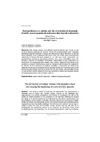Please use this identifier to cite or link to this item:
https://accedacris.ulpgc.es/jspui/handle/10553/58556
| Title: | Acercamiento a la cultura oral de L2 a través de la poesía infantil: una propuesta de aula para alumnos de traducción | Authors: | Clouet, Richard | UNESCO Clasification: | 58 Pedagogía | Keywords: | Poesía infantil Traducción Oralidad Lenguas extranjeras Nursery rhymes, et al |
Issue Date: | 2014 | Journal: | Skopos : revista internacional de traducción e interpretación | Abstract: | Este trabajo propone une reflexión sobre la relación que vincula un tipo de texto literario particular (la canción infantil) al correspondiente texto traducido, abordando algunas nociones y teorías que destacan el papel del lector (o sea del lector-traductor) en la producción del nuevo texto. Se revela como enormemente importante la lectura del texto original en voz alta para poder comprender sus
características fonéticas y sus efectos sonoros: rima, ritmo, musicalidad, tono, etc. Sonidos y sentido se entretejen haciéndose inseparables, lo que proporciona un sentimiento de incapacidad para traducir esta poesía, traducción que termina por constituir un desafío. Mostraremos, pues, la relevancia del concepto de oralidad en el proceso de la traducción de poemas infantiles y trataremos de explicar los aspectos en los que la percepción de los sentidos resulta tan importante como la de las formas para traducir este tipo de texto. De ahí que resulte imprescindible formar a nuestros alumnos de traducción para que aprendan a valorar los aspectos fónicos de la lengua extranjera y de su lengua materna. This study is aimed at analyzing the relationship that approximates a particular type of literary text, namely nursery rhymes, to the translated text, approaching a few poetic conceptions and theories to emphasize the role of the reader (or reader-translator) in the production of the new text. Reading the original text aloud is of utmost importance to understand its phonetical characteristics and sound effects: rhyme, rhythm, musicality, tone, etc. Sound and meaning are, indeed, totally intertwined and inseparable, hence the common thought that translating poetry represents an insurmountable challenge. We will show how relevant the concept of orality is when we read and translate nursery rhymes and we will also try to demonstrate that perceiving senses is as important as perceiving forms when translating poetry. Consequently, it is of utmost importance to teach our translation students to appreciate the sound effects of both the foreign language and their mother tongue. |
URI: | https://accedacris.ulpgc.es/handle/10553/58556 | ISSN: | 2255-3703 | Source: | Skopos : revista internacional de traducción e interpretación [ISSN 2255-3703] (5), p. 3-18 | URL: | http://dialnet.unirioja.es/servlet/articulo?codigo=5349335 |
| Appears in Collections: | Artículos |
Page view(s)
115
checked on Nov 1, 2024
Download(s)
73
checked on Nov 1, 2024
Google ScholarTM
Check
Share
Export metadata
Items in accedaCRIS are protected by copyright, with all rights reserved, unless otherwise indicated.
